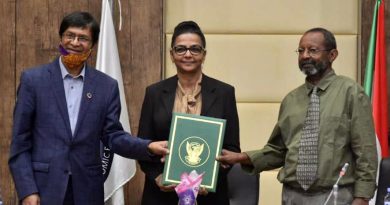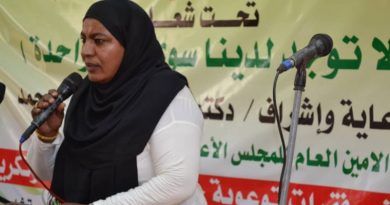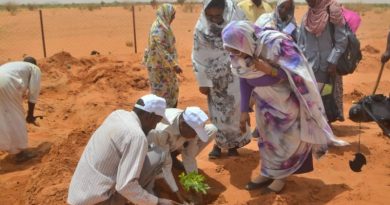Dr. Mona Mohamed Ali Ahmed, Secretary-General of the Higher Council for Environment and Natural Resources, congratulates the Sudanese people on World Environment Day.
Dr. Mona Mohamed Ali Ahmed-General of the Higher Council for Environment and Natural Resources congratulates the Sudanese people on World Environment Day, celebrated by the world on 5 June each year; it comes under the slogan “Only One Earth”. This day calls us to pay attention to the environment, protect it, preserve it and use its resources so that we can have decent life and take into account subsequent generations.
The Secretary-General called for preserve the environment from the challenges, it faces, which is namely; pollution, climate change and the extinction of biodiversity. She refers to the pollution problem from industrial waste which confront Sudan She pointed out that there are many factories and facilities that do not comply with standards for the treatment of materials and wastewater and they dispose them without to treatment. She added, in many cases, this waste water is drained into the groundwater, on which a large proportion of the population depends, which leads to water pollution. As well as air or air pollutants, which is an irresponsible activity, and factories do not treat their air residues, which increases the problem of damage or climate changes, which leads to the presence of greenhouse gases, which are the main cause of climate changes, in addition to pollution by solid waste, whether domestic or industrial, and visual pollution, and she added that industrial waste has a very big impact on health, soil and change in environmental characteristics.
She called on society and the State to adopt the concept of integrated environmental management of industrial enterprises and to work towards the treatment and reduction of pollutants prior to their release into the environment. As well as creating a law to prevent and limit these problems. She said so far there is no follow-up to these waste and reduction of pollutants resulting from agricultural activity.
She called for control and rationalization in the use of pesticides and fertilizers. She refers to two encounter problems: irresponsible mining and dilemma of climate change. Irresponsible mining destroys the biodiversity found in different reserves and habitats, rivers, floodplains, wetlands and forest diversity, as well as the dilemma of climate change, rivers, flood plains, wetlands and forest diversity.
She said that Sudan is affected by climatic changes, because there were areas within fragile and dry range and that the change in temperature and the amount of rain and its scarcity would change the agricultural and pastoral pattern and the lives and livelihoods of the population.
She pointed out that biodiversity will be threatened by large projects and major dams such as the Renaissance Dam. Large projects have catastrophic and destructive effects on living beings and biodiversity. It is our duty as a higher council responsible for protecting the environment in Sudan to clarify these impacts in order to preserve the environment and the wealth that God Almighty has endowed us with.




